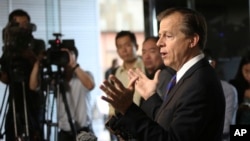The U.S. Special Envoy for North Korea Policy is in Asia this week, leading a delegation to China, South Korea and Japan to look for ways to persuade North Korea to give up its nuclear weapons program.
Arriving in Beijing Sunday, Ambassador Glyn Davies urged Pyongyang to return to what he called “meaningful diplomacy.”
Davies' trip comes at a time when North Korea leader Kim Jong-un has not been seen in public for weeks.
State television footage in recent months has shown the leader walking with a limp. Last week North Korean authorities confirmed that Kim is suffering from an “uncomfortable physical condition.”
Media speculation
This news has set off a range of media speculation that the young leader has gout, diabetes or high blood pressure, and even some rumors of instability in his regime.
In a country like North Korea, where the media is tightly controlled, any mention of a problem within the leadership, even an illness, is rare and important.
Daniel Pinkston, deputy Northeast Asia director for the International Crisis Group, said the country's authoritarian political system is inherently unstable.
“If a leader is unable to lead, then there are problems, quite often there are problems with transition. So that's when dictatorships are most vulnerable," Pinkston said.
But as far as outsiders are able to determine, the situation appears stable in North Korea.
Pinkston said state institutions, including military and security forces, continue to maintain control of the government.
Even if Kim is healthy and active, there would likely be no breakthrough in talks with the West to end North Korea's nuclear weapons program.
Pinkston said both sides remain locked in their opposing positions.
To resume talks
The U.S., South Korea and Japan need to see some indication that Pyongyang is serious about resuming talks, as was agreed to in 2005.
North Korea however continues to see its nuclear weapons as necessary instruments of state power.
"The only thing that matters is if North Korea changes its policy orientation and whether or not it begins to distance itself and change its policy orientation from Songun ideology, its military first ideology," Pinkston said.
When North Korea's Foreign Minister Ri Su Yong recently addressed the United Nations he said the nuclear issue will be resolved only after perceived threats to the country's independence are removed.





